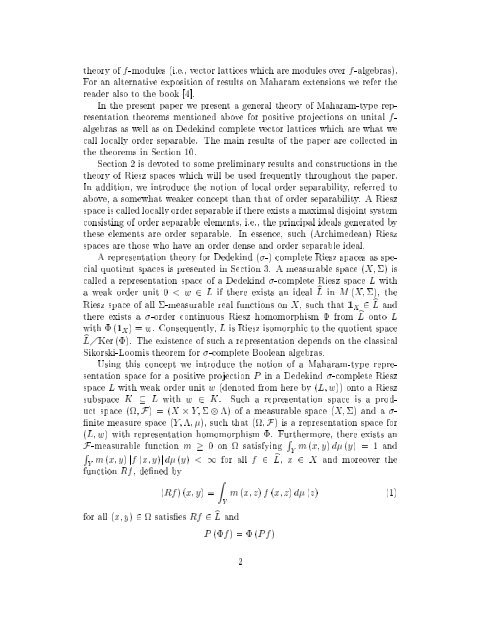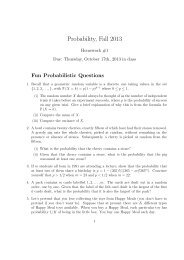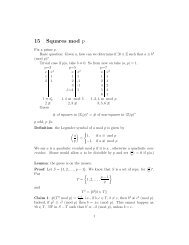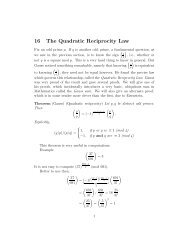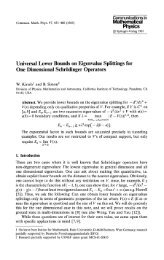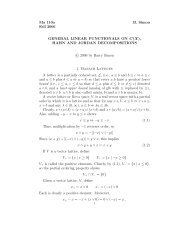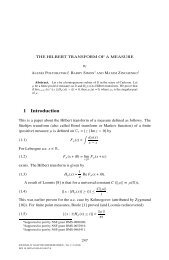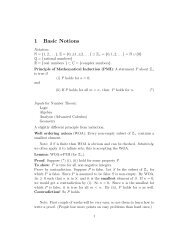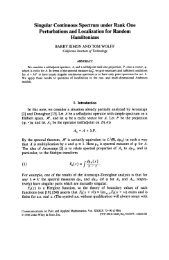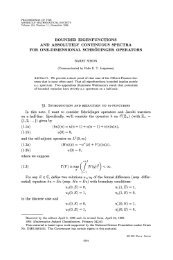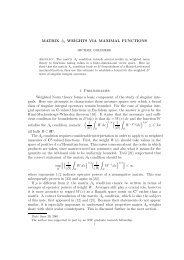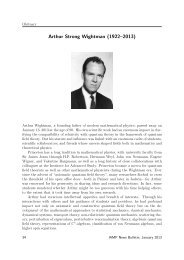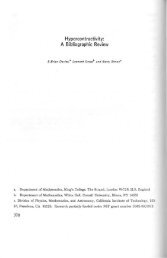Representations of positive projections 1 Introduction - Mathematics ...
Representations of positive projections 1 Introduction - Mathematics ...
Representations of positive projections 1 Introduction - Mathematics ...
Create successful ePaper yourself
Turn your PDF publications into a flip-book with our unique Google optimized e-Paper software.
theory <strong>of</strong> f-modules (i.e., vector lattices which are modules over f-algebras).<br />
For an alternative exposition <strong>of</strong> results on Maharam extensions we refer the<br />
reader also to the book [4].<br />
In the present paper we present a general theory <strong>of</strong> Maharam-type representation<br />
theorems mentioned above for <strong>positive</strong> <strong>projections</strong> on unital falgebras<br />
as well as on Dedekind complete vector lattices which are what we<br />
call locally order separable. The main results <strong>of</strong> the paper are collected in<br />
the theorems in Section 10.<br />
Section 2 is devoted to some preliminary results and constructions in the<br />
theory <strong>of</strong> Riesz spaces which will be used frequently throughout the paper.<br />
In addition, we introduce the notion <strong>of</strong> local order separability, referred to<br />
above, a somewhat weaker concept than that <strong>of</strong> order separability. A Riesz<br />
space is called locally order separable if there exists a maximal disjoint system<br />
consisting <strong>of</strong> order separable elements, i.e., the principal ideals generated by<br />
these elements are order separable. In essence, such (Archimedean) Riesz<br />
spaces are those who have an order dense and order separable ideal.<br />
A representation theory for Dedekind ( -) complete Riesz spaces as special<br />
quotient spaces is presented in Section 3. A measurable space (X ) is<br />
called a representation space <strong>of</strong> a Dedekind -complete Riesz space L with<br />
a weak order unit 0 < w 2 L if there exists an ideal bL in M (X ), the<br />
Riesz space <strong>of</strong> all -measurable real functions on X, such that 1X 2 bL and<br />
there exists a -order continuous Riesz homomorphism from bL onto L<br />
with (1X) =w. Consequently, L is Riesz isomorphic to the quotient space<br />
bL Ker ( ). The existence <strong>of</strong> such a representation depends on the classical<br />
Sikorski-Loomis theorem for -complete Boolean algebras.<br />
Using this concept we introduce the notion <strong>of</strong> a Maharam-type representation<br />
space for a <strong>positive</strong> projection P in a Dedekind -complete Riesz<br />
space L with weak order unit w (denoted from here by (L w)) onto a Riesz<br />
subspace K L with w 2 K. Such a representation space is a product<br />
space ( F) = (X Y ) <strong>of</strong> a measurable space (X ) and a -<br />
nite measure space (Y ), such that ( F) is a representation space for<br />
(L w) with representation homomorphism . Furthermore, there exists an<br />
F-measurable function m 0 on satisfying R m (x y) d (y) = 1 and<br />
R Y<br />
m (x y) jf (x y)j d (y) < 1 for all f 2 bL, x 2 X and moreover the<br />
Y<br />
function Rf, de ned by<br />
(Rf)(x y) =<br />
for all (x y) 2 satis es Rf 2 bL and<br />
Z<br />
Y<br />
m (x z) f (x z) d (z) (1)<br />
P ( f) = (Pf)<br />
2


